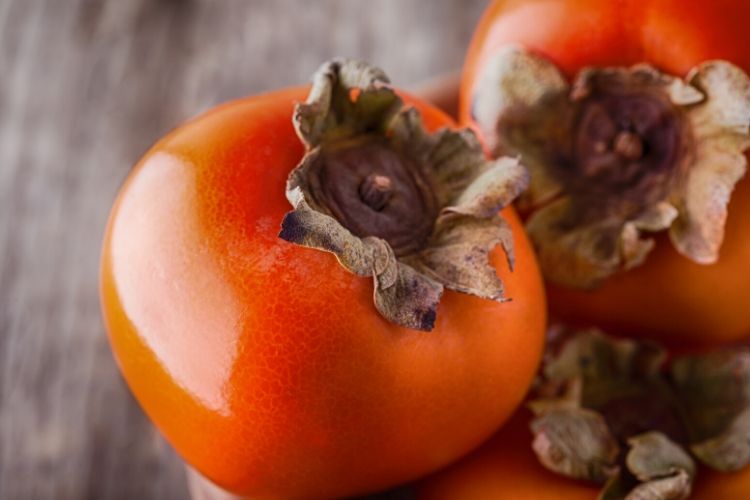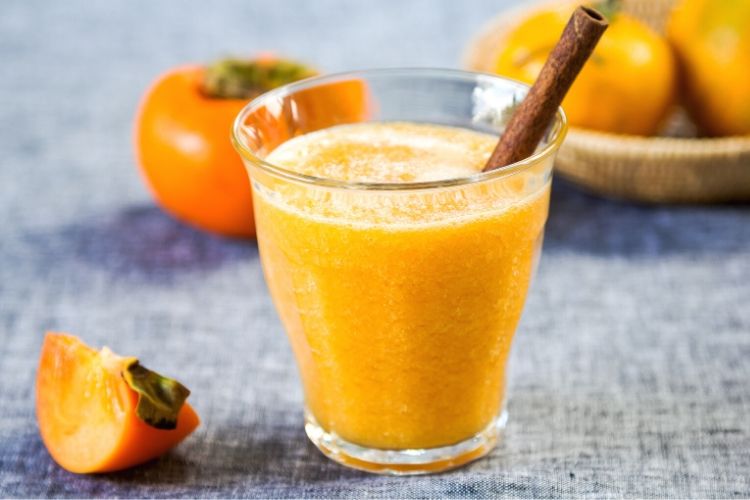Are Persimmons Good for Keto Diet

Persimmons are a sweet, juicy fruit with a honey-like flavor. They pair well with other foods and can be enjoyed fresh, dried or cooked. Although this fruit first originated in China, persimmons are popular around the world and often used as an ingredient in jams, jellies, curries, puddings, pies, and drinks.
Aside from tasting great, they are also packed with vital nutrients that have the potential to improve your health in many ways. To name a few, they promote heart health, reduce inflammation and aid digestion.
Persimmons also contain active plant compounds that can help you lose weight and ward off obesity-related diseases, such as diabetes and cardiovascular disease. Studies show that persimmons also have the power to lower cholesterol and triglyceride levels.
Keep reading to find out more about this amazing fruit and how adding it to your diet can benefit your health and vitality.
Are Persimmons Keto Friendly?
Most ketogenic diet guidelines restrict carbs to only 15 – 30 grams of net carbohydrates per day. Persimmons can fit into the Keto diet in moderate amounts.
A medium persimmon contains 8 grams of total carbs, so it can be a keto-friendly fruit if consumed in moderate amounts.
If you're a very active person who exercises 4 to 5 times a week, you can consume more persimmons without any repercussions.
How Many Carbs are in Persimmons?
Fresh: One 25-gram persimmon contains 8 grams of carbs.
Dried: Dried persimmons contain a whopping 73 grams of carbs per 100-serving.
If you are following a low carb diet, choose fresh persimmons over the dried variety as they are far lower in carbs. Eating just a few slices of dried persimmons could easily cause you to exceed your daily carb count.
How Many Calories are in Persimmons?
Fresh: There are 32 calories in 1 persimmon (25 grams).
Dried: 100 gram serving of dried persimmons contains 274 calories.
If you're following a calorie-reduction diet plan, stick to fresh persimmons as they are exponentially lower in calories than the dried variety, which are extremely calorie-dense.
Nutrition Facts
| Serving size: 1 persimmon fruit (25 grams) | |
| Calories 32 | |
| Total Fat 0.1 grams | 0% |
| Cholesterol 0 milligrams | 0% |
| Sodium 0.3 milligrams | 0% |
| Potassium 77.5 milligrams | 2% |
| Total Carbohydrate 8 grams | 2% |
| Protein 0.2 grams | 0% |
| Vitamin A | 0% | Vitamin C | 27% |
| Calcium | 0% | Iron | 3% |
| Vitamin D | 0% | Vitamin B-6 | 0% |
| Cobalamin | 0% | Magnesium | 0% |

Health Benefits
Rich in Nutrients
Persimmons are an excellent course of vitamins A, B, C, E, and K. Just one persimmon contains over half the recommended intake of vitamin A, a fat-soluble vitamin critical for immune function and healthy vision. Persimmons also contain beneficial plant compounds like tannins and flavonoids. The fruit is also a good source of potassium, copper, manganese, thiamine, riboflavin, folate, magnesium and phosphorus.
Rich in Antioxidants
Persimmons are rich in powerful antioxidants in the form of carotenoids and flavonoids. Diets rich in these potent plant compounds are associated with a lower risk of cancer, heart disease and diabetes.
Promotes Heart Health
Other antioxidants that are naturally bioavailable in persimmons are quercetin and kaempferol. These flavonoids and tannins benefit heart health by lowering blood pressure, preventing inflammation and lowering unhealthy LDL cholesterol levels.
Anti-Inflammatory Properties
Inflammation is a common cause of many diseases. Persimmons are a good source of vitamin C, which is another powerful antioxidant that helps lower inflammation. Studies have linked adequate intake of vitamin C to a reduced risk of inflammatory conditions such as heart disease, certain cancers and diabetes.
Supports Digestion
Fiber-rich foods like persimmons can help keep your digestive system healthy and promote regularity. For this reason, consuming persimmons may help relieve constipation.
Promotes Eye Health
Persimmons are rich in vitamin A, lutein and zeaxanthin, nutrients that support healthy eyesight. These nutrients also lower the risk of developing age-related macular degeneration, an eye disease that can cause vision loss.
Side Effects
Persimmons are generally safe in normal food amounts; however, they can cause allergic reactions in individuals prone to allergies.
Because persimmons may lower blood pressure, surgeons claim persimmon may interfere with blood pressure control during surgery and post-surgery. If you have a surgery scheduled, it is recommended that you avoid eating persimmons for at least 2 weeks prior to the procedure.

10 Great Ways to Enjoy Persimmons on Keto
Persimmons can be added to your ketogenic diet in the following ways:
- Slice persimmons onto a salad to add a little sweetness.
- Top Greek yogurt with fresh or cooked persimmon for added flavor.
- Roast persimmons in the oven and top with sugar-free whipped cream for a tasty, low carb dessert.
- Add fresh persimmon chunks to low carb muffins made with almond flour.
- Combine persimmon slices with berries and citrus fruits for a low carb fruit salad.
- Grill persimmon and serve with creamy Brie cheese as a unique appetizer.
- Bake persimmons with chicken, pork or beef to add interest to your dishes.
- Add a small amount of diced dried persimmons to homemade energy balls or power bars for a chewy consistency.
- Add fresh or frozen persimmon slices to your smoothie as a honey-like, natural sweeter.
- Enjoy a fresh persimmon with a handful of nuts or a slice of cheese as an energizing pre-workout snack.
Persimmons are full of fiber and low in calories, which makes them a great food choice if you're trying to shed unwanted pounds. Persimmons also contain active compounds called polyphenols that protect your body against oxidative stress, which in turn helps prevent obesity, diabetes and cardiovascular disease.
Animal studies were conducted on the effect of persimmon fruits on lipid metabolism in subjects with diet-induced obesity. Dried and powdered persimmons were added to the diets of obese test subjects. It was found that the subjects that were supplemented with the persimmon fruit significantly reduced the rise in plasma lipids (fat in the blood). They also experienced lower triglyceride and LDL cholesterol levels.
Are Persimmons Safe to Eat During Pregnancy?
Although just one persimmon contains over half the recommended intake of vitamin A, a fat-soluble vitamin critical for immune function and fetal development, not enough is known about the use of persimmons during pregnancy and breast-feeding. Stay on the safe side and avoid consuming persimmons during pregnancy or while breast-feeding.
Are Persimmons Good for your Skin?
Did you know that persimmons are used in the beauty routines of beautiful Japanese Geishas and even Victoria Secret models? The vitamin C in persimmons can bring dry skin back to life. The fruit's antioxidant properties help keep impurities away and restore the youthfulness of your skin.
Furthermore, the high water content of persimmons moisturizes the skin and the natural acids provide a rejuvenating anti-inflammatory effect. The tannins contained in the fruit aid in wound healing and help heal the skin abrasions and acne scars. Other trace nutrients (potassium, magnesium, phosphorus, calcium, iron) also provide nourishment to the skin.
You can create your own DIY face mask using just 2 ingredients: persimmons and honey. Simply wash and peel the persimmon and then mash it in a small bowl along with a tablespoon of honey. Apply the mixture to your face for 5 minutes, rinse well with cool water and pat dry.
Are Persimmons Safe for Diabetics?
Persimmons can be a part of a diabetic-friendly diet if consumed in moderate amounts.
One persimmon contains 21 grams of natural sugar (fructose) and 6 grams of fiber. Fiber-rich foods like persimmons slow the rate of digestion and sugar absorption, which prevents a spike in blood sugar.
In fact, a study conducted on 117 people with diabetes showed that increased consumption of soluble dietary fiber, like the type of fiber in persimmons, led to significant improvements in blood sugar control. Besides lowering blood sugar, fiber-rich foods like persimmons can help lower cholesterol and support healthy digestion.
Are Persimmon Seeds Poisonous?
While peach pits and plum seeds contain cyanide and can cause poisoning, the seeds of the persimmon are non-toxic and do not contain cyanide. However, if eaten they can cause inflammation and blockages of the small intestine. Therefore, it is best to avoid consuming persimmon seeds.
How Can I Tell if a Persimmon is Ripe Enough?
When picked immature, persimmons are firm to the touch and contain high levels of tannins that make them bitter and not very nice tasting. As the fruit ripens, the tannins fade and the fruit becomes more sweet and juicy. A fully ripe persimmon feels quite soft.
Is the Persimmon Peel Edible? Yes, persimmon peel or skin is completely edible and rich in nutrients. Whether or not to eat the persimmon peel is a matter of taste and texture preference.
Are Persimmons Good for Keto Diet
Source: https://www.lowcarbhack.com/persimmons-keto-carbs-calories/